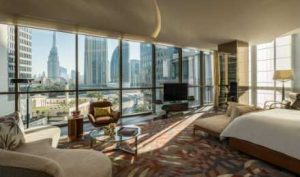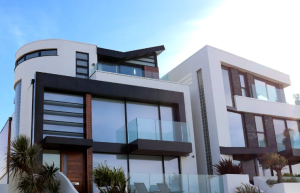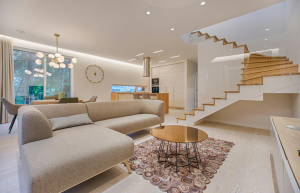Palm Jumeirah, the iconic man-made island in Dubai, is synonymous with luxury and opulence. Known for its stunning architecture and prime real estate, homes in Palm Jumeirah offer unparalleled living experiences. However, as environmental awareness increases, many homeowners are seeking ways to align their luxurious lifestyles with sustainable practices. This is particularly evident in kitchen renovations, where modern design meets eco-friendly choices. This comprehensive guide explores various aspects of kitchen renovations in Palm Jumeirah, focusing on sustainability, aesthetics, and functionality.
The Importance of Sustainable Kitchen Renovations
Sustainable kitchen renovations are crucial for reducing environmental impact and creating healthier living spaces. Kitchens are high-traffic areas that consume significant amounts of energy and water. By integrating eco-friendly practices into kitchen renovations, homeowners can minimize their carbon footprint and enhance the overall efficiency of their homes.
Environmental Benefits
The environmental benefits of sustainable kitchen renovations are manifold. By opting for energy-efficient appliances, sustainable materials, and water-saving fixtures, homeowners can significantly reduce their resource consumption. This not only helps in conserving the environment but also contributes to the global effort of mitigating climate change.
Economic Advantages
While the initial investment in sustainable kitchen renovations can be substantial, the long-term savings are considerable. Energy-efficient appliances and fixtures lower utility bills, and sustainable materials often have greater durability, reducing the need for frequent replacements. Additionally, eco-friendly homes typically have higher resale values, making them a wise investment.
Health and Well-being
Sustainable kitchens promote better indoor air quality and a healthier living environment. The use of non-toxic materials, improved ventilation, and natural lighting all contribute to the well-being of the home’s occupants. In Palm Jumeirah, where luxury and comfort are paramount, these health benefits are an added advantage.
Key Elements of Sustainable Kitchen Renovations
When renovating a kitchen in Palm Jumeirah, focusing on sustainability does not mean compromising on style or functionality. Here are key elements to consider for an eco-friendly yet luxurious kitchen renovation:
Energy-Efficient Appliances
Modern kitchens are equipped with numerous appliances, each contributing to the overall energy consumption of the home. Opting for energy-efficient appliances is a crucial step in creating a sustainable kitchen.
Induction Cooktops
Induction cooktops are more energy-efficient than traditional gas or electric stoves. They heat up quickly and provide precise temperature control, making cooking more efficient and reducing energy wastage.
Energy Star Appliances
Look for appliances with the Energy Star label, which indicates superior energy efficiency. This includes refrigerators, dishwashers, ovens, and microwaves. These appliances not only save energy but also reduce utility bills.
Water Conservation
Water conservation is a critical aspect of sustainable kitchen renovations, especially in arid regions like Dubai. Implementing water-saving fixtures and practices can significantly reduce water usage.
Low-Flow Faucets
Low-flow faucets are designed to reduce water consumption without compromising on performance. They mix air with water to maintain pressure while using less water, helping conserve this precious resource.
Efficient Dishwashers
Modern dishwashers are more water-efficient than hand washing, provided they are used correctly. Choose a dishwasher with a high efficiency rating and use it only when fully loaded to maximize water savings.
Sustainable Materials
The choice of materials plays a significant role in the sustainability of a kitchen renovation. Opt for materials that are renewable, recycled, or have a low environmental impact.
Recycled Countertops
Countertops made from recycled materials, such as glass, concrete, or paper composite, offer an eco-friendly alternative to traditional options. They are durable, stylish, and significantly reduce the demand for new raw materials.
Bamboo Cabinets
Bamboo is a rapidly renewable resource that makes an excellent material for kitchen cabinets. It is durable, lightweight, and has a unique aesthetic that adds a touch of elegance to any kitchen.
Reclaimed Wood
Using reclaimed wood for cabinetry, flooring, or shelving gives old materials a new life. This not only reduces the demand for new timber but also adds character and history to the kitchen design.
Lighting
Effective lighting is essential in any kitchen. Sustainable lighting solutions can enhance the ambiance while reducing energy consumption.
LED Lighting
LED lights are highly energy-efficient and have a longer lifespan compared to traditional incandescent bulbs. They are available in various styles and can be used for task lighting, ambient lighting, and accent lighting.
Natural Light
Maximizing natural light in the kitchen reduces the need for artificial lighting during the day. Consider installing large windows, skylights, or glass doors to bring in more sunlight and create a bright, welcoming space.
Smart Technology
Incorporating smart technology into kitchen renovations can further enhance sustainability by optimizing energy and water usage.
Smart Thermostats
Smart thermostats can be programmed to regulate the temperature efficiently, ensuring that heating and cooling systems are used only when necessary. This reduces energy consumption and maintains a comfortable environment in the kitchen.
Smart Appliances
Smart appliances can be controlled remotely and programmed to operate during off-peak hours, reducing energy costs. They also provide feedback on usage patterns, helping homeowners identify areas for further efficiency improvements.
Waste Management
Proper waste management during and after kitchen renovations is essential for sustainability. This includes recycling construction waste and incorporating waste reduction practices into everyday kitchen use.
Construction Waste Recycling
Many materials from kitchen renovations can be recycled, including metal, glass, and certain types of wood and plastic. Partner with a recycling company to ensure that demolition and construction waste is properly managed.
Composting
Incorporate a composting system for kitchen waste. Composting organic waste reduces the amount of waste sent to landfills and provides nutrient-rich soil for gardening.
Design Tips for Luxurious and Sustainable Kitchens
Creating a sustainable kitchen in Palm Jumeirah doesn’t mean sacrificing luxury. Here are some design tips to blend eco-friendliness with high-end aesthetics:
Open Concept Design
An open concept kitchen design not only creates a spacious and inviting environment but also enhances natural light and ventilation. This reduces the need for artificial lighting and improves indoor air quality.
Minimalist Aesthetics
A minimalist design focuses on simplicity and functionality, reducing the need for excessive materials and clutter. This design philosophy aligns well with sustainability by emphasizing quality over quantity.
High-Quality Finishes
Investing in high-quality finishes ensures durability and reduces the need for frequent replacements. Opt for timeless designs that won’t go out of style, thereby extending the lifespan of the kitchen’s aesthetic appeal.
Custom Cabinetry
Custom cabinetry allows for better use of space and resources. Tailor-made cabinets can be designed to fit specific needs, reducing waste and enhancing functionality.
Eco-Friendly Paints
Use paints with low volatile organic compounds (VOCs) to improve indoor air quality. These paints emit fewer harmful chemicals, making the kitchen environment healthier for occupants.
Case Study: A Sustainable Kitchen Renovation in Palm Jumeirah
To illustrate the potential of sustainable kitchen renovations, let’s consider a case study of a Palm Jumeirah villa that underwent an eco-friendly transformation.
Initial Assessment
The villa’s kitchen was originally designed with conventional materials and appliances, resulting in high energy and water consumption. The layout was cramped, with limited natural light and ventilation.
Renovation Plan
The renovation plan focused on sustainability and modern design. Key elements included:
- Energy-Efficient Appliances: Upgraded to Energy Star-rated refrigerators, dishwashers, and ovens.
- Water Conservation: Installed low-flow faucets and an efficient dishwasher.
- Sustainable Materials: Used recycled glass countertops, bamboo cabinets, and reclaimed wood for shelving.
- Lighting: Installed LED lighting and added large windows to maximize natural light.
- Smart Technology: Integrated smart thermostats and appliances to optimize energy usage.
- Waste Management: Partnered with a recycling company for construction waste and implemented a composting system for kitchen waste.
Results
The renovated kitchen saw a 40% reduction in energy consumption and a 30% decrease in water usage. The new layout enhanced natural light and ventilation, creating a bright and airy space. The use of sustainable materials and smart technology not only improved the kitchen’s environmental performance but also added to its aesthetic appeal. The homeowners were thrilled with the transformation, enjoying a luxurious yet eco-friendly kitchen that aligned with their values.
Conclusion
Kitchen renovations in Palm Jumeirah offer an excellent opportunity to blend luxury with sustainability. By focusing on energy efficiency, water conservation, and the use of eco-friendly materials, homeowners can create beautiful, functional kitchens that have a minimal environmental impact. Sustainable kitchen renovations are not only beneficial for the environment but also provide economic and health advantages, making them a wise investment for the future.
As the world moves towards greener living, Palm Jumeirah homes can set an example of how luxury and sustainability can coexist. With thoughtful planning and innovative design, it’s possible to transform any kitchen into a space that is both elegant and eco-friendly. By embracing sustainable practices, homeowners can contribute to a more sustainable future while enjoying the unparalleled luxury that Palm Jumeirah offers.



